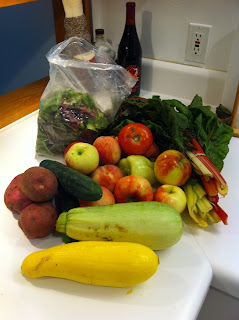One day in July I arrived on Tech’s campus for a meeting and
to submit some paperwork. I opened my car door, looked across the street, and
immediately recognized a former student, John, who asked, astonished, “What are
YOU doing here?” We held a brief reunion, discussed my new job, his new degree
and future plans, and wished each other well. A familiar face tempered my
anxiety, and I felt almost at home. The first weekend in August, I moved into
our small house, and, since then, I have been exploring, seeking a feeling for
people and place.
 |
| Farmer's Market Findings |
This past weekend was my first one here in Blacksburg. I am
alone until the end of the month and trying to find a sense of home in this new
place and space—as a person and as a teacher, too. On Saturday morning, I
visited the bi-weekly farmer’s market, which, astonishingly, is bigger than the
one where I lived in Berkeley Springs. All
the vegetables, fruits, baked goods, meat, eggs, and other products there are
produced within a 50 mile radius of Blacksburg, so the market truly offers a
sense of what is local, what it means to be here. I walked around, talked to
vendors and organizers, sampled some apples, and purchased much of my food for
the week.
I almost felt at home. The locals here speak an Appalachian
twang similar to but also different from the dialect I know—like the difference
between the Ginger Gold and the Johnathan apples I sampled at the market this
morning. Both are sweet, both familiar, but different in texture, tone, and
tartness. The conversations I had echoed of home, and of the market I remember.
I bought a bunch of rainbow chard, and the vendor gave me a second one for
free; “Grab two,” she said, sweeping her braid behind her shoulder, “we have a
lot this week.” I thought of Rachel, my former student, who works on her family
farm and always saved apples aside for me in the Fall; Honeycrisp, my favorite,
always sold quickly at the farmer’s market in the Springs.
On Sunday, I found trails to run at Pandapas Pond. These
trails are more populated than those I ran in and around Morgan County, but
they’re muddy and forested and full of twists, rocks, and roots. My legs
strained against the sharp turns and steep climbs, and, in a way, moving
through the woods in Jefferson National Forest felt like home. I looped around
the pond, watched by grumbling geese, then worked my way up the hills and back
down, an hour sweating in the trails. I remembered the bear who frequently I
saw at Cacapon State Park when I ran trails there, the way I would glimpse his
fat rear crashing away through the brush as I rounded a bend. I recalled the ladyslipper
orchids that cover one stretch of trails there in the spring. I hope to find
the same sense of wonder here that made me feel so at home in Morgan County. And
these experiences are signs, it seems, that I will.
Yet still, I feel slightly out of place—I am exploring place
and program, trying to understand what it means to be here now and what my role
will be professionally. In shaping my new life here, I am also shaping my
teacherly self, settling into a sense of home that I hope will spiral out to my
classroom practice. Brooke (2003) writes that “rich” learning is “tied to and
flow[s] from local culture, “ since “Local communities, regions, and histories
are the places where we shape our individual lives...” (p. 4). In seeking my
own sense of place (physical, personal, and professional) connected to this new
space, I am working to conceptualize myself as a learner and teacher at home
(not yet home), here, in Blacksburg. This ripples out from me and toward
learning implications for my students, who come from here, and also for the
students whom they will teach. I hope my classroom will come to feel like home,
welcoming my students who also welcome me, reading and writing together, creating
a sense of place, shaped by the lived space and community in which we learn. And so, I head out again today—to explore, to play,
to work, and to learn, in search of home.
Reference
Brooke, R. (2003). Introduction: Place-conscious
education, rural schools, and the Nebraska writing project's
rural voice, country schools team. In R. Brooke (Ed.), Rural voices:
Place-conscious education and the teaching of writing (pp. 1-20). New York, NY: Teachers College Press.

No comments:
Post a Comment